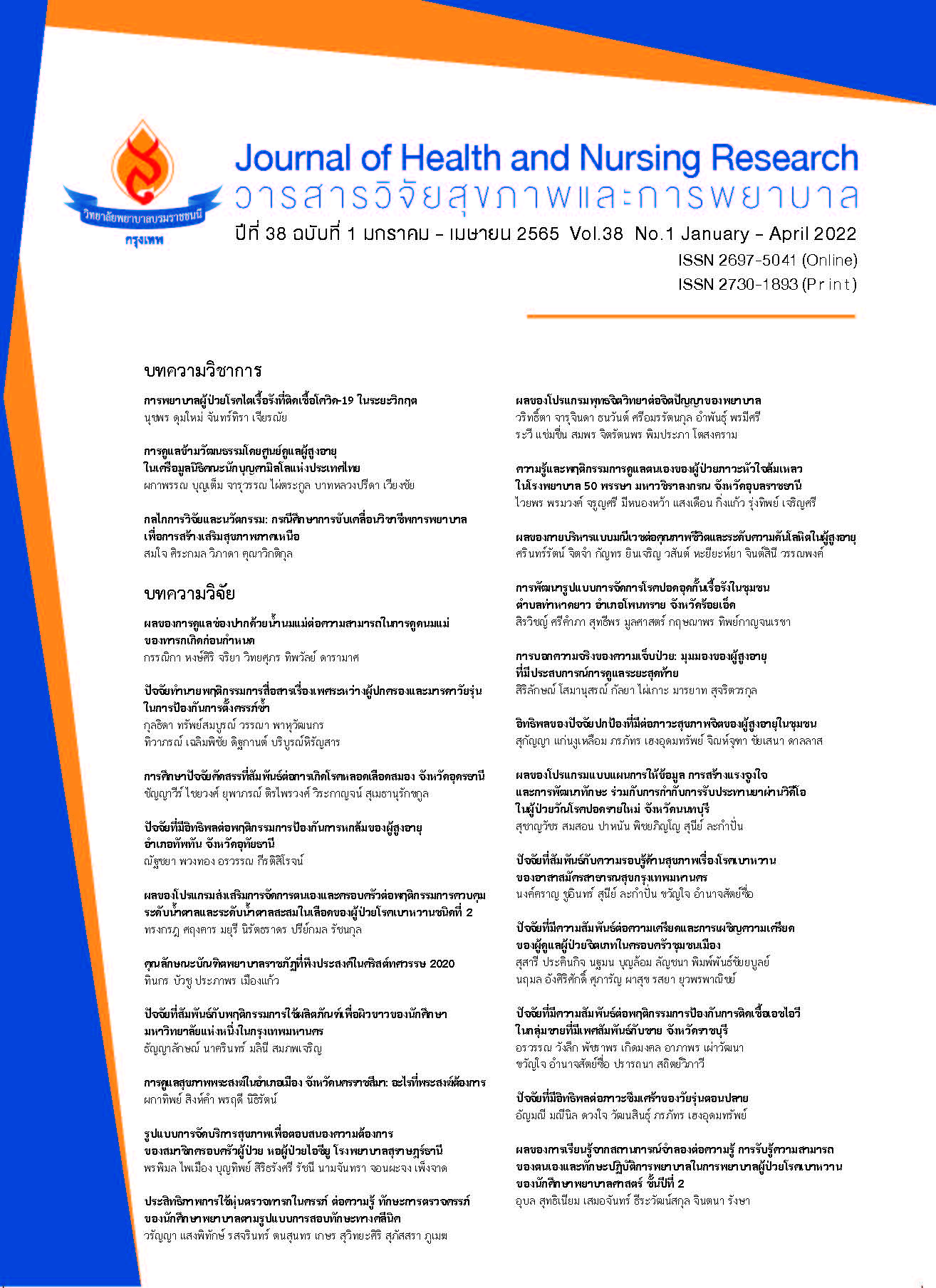ผลของโปรแกรมส่งเสริมการจัดการตนเองและครอบครัวต่อพฤติกรรม การควบคุมระดับน้ำตาลและระดับน้ำตาลสะสมในเลือด ของผู้ป่วยโรคเบาหวานชนิดที่ 2
คำสำคัญ:
โปรแกรมส่งเสริมการจัดการตนเองและครอบครัว, ผู้ป่วยโรคเบาหวานชนิดที่ 2, พฤติกรรมเพื่อควบคุมระดับน้ำตาลในเลือด, ระดับน้ำตาลสะสมในเลือดบทคัดย่อ
บทคัดย่อ
บทนำ: โรคเบาหวานเป็นโรคเรื้อรังที่ต้องดูแลรักษาต่อเนื่อง หากไม่สามารถควบคุมระดับน้ำตาลในเลือดสะสมให้เป็นปกติได้ย่อมทำให้เกิดภาวะแทรกซ้อนที่มีผลกระทบต่อตัวผู้ป่วยและครอบครัว
วัตถุประสงค์การวิจัย: เพื่อศึกษาผลของโปรแกรมส่งเสริมการจัดการตนเองและครอบครัวต่อพฤติกรรมการควบคุมระดับน้ำตาลและระดับน้ำตาลในเลือดของผู้ป่วยโรคเบาหวานชนิดที่ 2
ระเบียบวิธีวิจัย: การวิจัยครั้งนี้เป็นการวิจัยกึ่งทดลองแบบสองกลุ่มวัดก่อนและหลังการทดลอง กลุ่มตัวอย่าง คือ ผู้ป่วยที่ได้รับการวินิจฉัยว่าเป็นโรคเบาหวานชนิดที่ 2 โรงพยาบาลเอกชนในเขตกรุงเทพมหานคร สุ่มเข้ากลุ่มทดลองและกลุ่มควบคุม กลุ่มละ 30 คน กลุ่มทดลองได้รับโปรแกรมส่งเสริมการจัดการตนเองและครอบครัว กลุ่มควบคุมได้รับการพยาบาลตามปกติ เครื่องมือที่ใช้ในการเก็บรวบรวมข้อมูล ได้แก่ 1) แบบสอบถามข้อมูลทั่วไป 2) แบบสอบถามพฤติกรรมการควบคุมระดับน้ำตาลของผู้ป่วยโรคเบาหวาน และ3) เครื่องตรวจระดับHbA1c วิเคราะห์ข้อมูลโดยใช้ค่าเฉลี่ย ร้อยละ ส่วนเบี่ยงเบนมาตฐาน สถิติทดสอบdependent t test และ independent t test
ผลการวิจัย: พบว่า กลุ่มได้รับโปรแกรมฯ มีคะแนนเฉลี่ยพฤติกรรมการควบคุมระดับน้ำตาลมากกว่าก่อนเข้าร่วมโปรแกรมฯ (p < .05) และมากกว่ากลุ่มไม่ได้รับโปรแกรมฯ (p < .05) รวมทั้งมีค่าเฉลี่ยระดับน้ำตาลสะสมในเลือดลดลงกว่าก่อนเข้าร่วมโปรแกรมฯ (p < .05) และน้อยกว่ากลุ่มไม่ได้รับโปรแกรม (p < .05)
สรุปผล: ผลของโปรแกรมส่งเสริมการจัดการตนเองและครอบครัว ทำให้ผู้ป่วยโรคเบาหวานและครอบครัวมีการจัดการร่วมกันในการปฏิบัติพฤติกรรมเพื่อควบคุมระดับน้ำตาลในเลือด และเป็นผลให้ระดับน้ำตาลในเลือดลดลง
ข้อเสนอแนะในการนำผลการวิจัยไปใช้: ควรจัดกิจกรรมส่งเสริมการจัดการของครอบครัวร่วมกับการจัดการดูแลตนเองของผู้ป่วยโรคเบาหวานเพื่อควบคุมระดับน้ำตาลในเลือด
Downloads
เอกสารอ้างอิง
Diabetes Association of Thailand, The Royal College Physicians of Thailand, The Endocrine Society of Thailand, Institute of Medical Research & Technology Assessment Department of Medical Services and National Health Security Office. Clinical practice guideline for diabetes 2017. 2nd ed. Pathumthani: Romyen Media Company Limited; 2017. (In Thai)
Office of The Permanent Secretary Ministry of Public Health. Indicators report [internet]. 2019 [cited 2019 August 6]. Available from: https://hdcservice.moph.go.th/hdc/reports/ (In Thai)
Thuntirasopanakul N, Wacharasin C, Deoisres W. Factors influencing family management in family with type 2 diabetes mellitus. The Journal of Faculty of Nursing Burapha University 2011;19(supplement 1):35-49. (In Thai)
Usai P, Muangsom N, Kowit P. Factors associated with level control blood sugar of type 2 diabetes patients registered in Tambon Khet health promoting hospital responsible for Ban Phai hospital Khon Kaen province. KKU Journal for Public Health Research 2012;5:11-20. (In Thai)
Jiamjarasrangsri W. Type 2Diabetes Epidemiology, Prevention and self-management support. Bangkok: Text and Journal Publication Company; 2017. (In Thai)
Chungsamarn S. Type 2 diabetes / metabolism. Nonthaburi : PTINTER PRINT; 2017. (In Thai)
Sirikutjatuporn K, Wirojratana V, Jitramontree N. Factors predicting self-management behavior of elderly type 2 diabetes patients. Journal Thai Nursing and Midwifery Council 2017;32:81-93. (In Thai)
Brunisholz KD, Briot P, Hamilton S. Diabetes self-management education improves quality of care and clinical outcomes determined by a diabetes bundle measure. Journal of Multidisciplinary Healthcare 2014;7:533–42.
Jones A, Gladstone BP, Lubeck M, Lindekilde N, Upton D, Vach W. Motivational interventions in the management of HbA1c levels: A systematic review and meta-analysis. Prim Care Diabetes 2014;8:91–100.
Siriwattanapornkul T, Oba N, Intarakunhang Na Rachasima S. Factors related to blood glucose level among patients with diabetes mellitus type II. Journal of Nursing Science Naresuan University 2007;1:57-67. (In Thai)
Wacharasin C. Nursing interventions for families experiencing chronic illness. Chonburi: Chonburiprinting; 2017. (in Thai)
Kornchatree Y. Social support in type 2 diabetes patients in the 16th public health center (Lumphini), Bangkok Metropolitan [master’s thesis]. Bangkok: Mahidol University; 2013. (in Thai).
Ryan P, Sawin KJ. The individual and family Self-Management Theory: Background and
perspectives on context, process, and outcomes. Nursing Outlook 2009;57:217-25.
Rungsin R, Tatsanavivat P, Medical research network of the consortium of the Thai medical school working group. Data collection and analysis for care among patients diagnosed with type 2 diabetes and hypertension visiting hospitals in care of ministry of public health and hospital in Bangkok in Thailand, 2018 [Internet]. 2018 [cited 2021 February 2]. Available from: https://dmht.thaimedresnet.org/document/ (in Thai)
Buasri Y. Effects of self-and family management program on dietary behavior and blood sugar level among persons with type 2 diabetes [master’s thesis]. Chonburi: Burapha University; 2018. (in Thai).
Grey M, Knafl K. McCorkle R. A framework for the study of self-and family management of chronic conditions. Nursing Outlook 2006; 54:278-86.
Polonsky W, Fisher L, Schikman CH, Hinnen DA, Parkin CG, Jelsovsky Z, et al. Structured self-monitoring of blood glucose significantly reduces a1c levels in poorly controlled noninsulin-treated type 2 diabetes: results from the structured testing program study. Diabetes Care 2011;34:262–67.
Intaboot K, Kalampakorn S, Pichayapinyo P. The Effect of a Self-Management and Social Support Program for on New Cases with Type 2 Diabetes 2017;31:11-26. (in Thai)
Wungrath J, Saengyo S, Ummee K. Barriers to health care practice that impact to glycemic control among elderly with diabetes mellitus. Journal of Community Development and Life Quality 2018;6(2):351-61. (in Thai)
American Diabetes Association. Nutrition therapy for adults with diabetes or prediabetes: a consensus report. Diabetes Care 2019;42(5):731-54.
Tiyawisutsri C, Chaisa P, Wanchai A, Pinsakul C. Exercise to control blood sugar levels of patients with type 2 diabetes in Thailand: a systematic review. Nursing Public Health and Education Journal 2018;19(2):39-46. (in Thai)
American College of Sports Medicine. ACSM’s guidelines for exercise testing and prescription. (9th ed) 2014. Philadelphia: Lippincott Williams & Wilkins.
Hackett RA, Steptor A. Type 2 diabetes mellitus and psychological stress – a modifiable risk factor.Nat Rev Endocrinol 2017;13(9):547-60.
Surawong S, Choowattanapakorn T. The effect of an individual and family self-management program on HbA1c in older persons with type 2 diabetes mellitus. Journal of Nursing Science Chulalongkorn University 2017;29(1):104-16. (in Thai)
ดาวน์โหลด
เผยแพร่แล้ว
รูปแบบการอ้างอิง
ฉบับ
ประเภทบทความ
สัญญาอนุญาต
ลิขสิทธิ์ (c) 2022 วารสารวิจัยสุขภาพและการพยาบาล (วารสารวิทยาลัยพยาบาลบรมราชชนนี กรุงเทพ)

อนุญาตภายใต้เงื่อนไข Creative Commons Attribution-NonCommercial 4.0 International License.
บทความที่ได้รับการตีพิมพ์ เป็นลิขสิทธิ์ของวารสารวิจัยสุขภาพและการพยาบาล (วิทยาลัยพยาบาลบรมราชชนนี กรุงเทพ) ไม่สามารถนำไปตีพิมพ์ซ้ำในวารสารฉบับอื่น


















